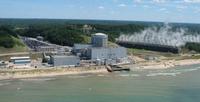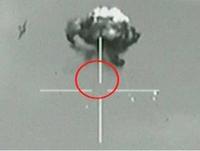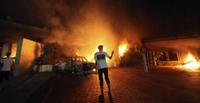-
Defense firms growing anxious about sequestration-related defense cuts
Defense contractors are growing anxious as they still do not know whether $500 billion in defense cuts will take place on 1 January 2013 as a result of sequestration; many firms are hoping that the administration and Congress will come to a budget agreement once the election is over, but at the same time, it is something contractors cannot rely on; what complicates the issue is the Worker Adjustment and Retraining Notification Act (WARN), which requires employers with more than 100 employees to give employees a 60-day notice before mass lay-offs or plant closure
-
-
Scenario-based gaming exercise to improve intelligence analysis
Raytheon has created a scenario-based gaming exercise to study in depth the intelligence analyst’s tradecraft; the company says the goal is ultimately to help analysts produce the best intelligence products and streamline workflows
-
-
NRC sees no evidence of bad security practices at Michigan nuclear plant

The Nuclear Regulatory Committee (NRC) released information last week about a leak earlier this summer at the Palisades plant near South Haven, Michigan; the plant has been mired in controversy this year, as at least three water leaks have occurred in the past several months, and the plant has one of the worst safety ratings in the United States
-
-
Environmentalists concerned about earthquakes tests near California nuclear plant
The Pacific Gas and Electric Company (PG&E) wants to use air guns to emit strong sound waves into a large near-shore area which includes parts of marine reserves; the purpose: creating three dimensional maps of fault zones near its Diablo Canyon nuclear plant in California; the plans have federal and state officials concerned about marine life and public safety
-
-
Hezbollah drone shot down over Israel

The Israel Air Force (IAF) planes shot down a UAV over the north Negev; the UAV entered Israeli air space from the west, but Israeli intelligence says the drone was launched by Hezbollah in Lebanon, then made its way south over the Mediterranean, then turned east when it reached the water off the Gaza Strip
-
-
Small airports face reduction in TSA funding for security measures
The Transportation Security Administration (TSA) is reducing funding designated to help smaller airports provide law enforcement officers at passenger screenings; since the 9/11 attacks, the TSA mandated that one law enforcement officer be present when commercial passengers are screened at airports; the TSA has now changed the way it circulates funding for this program, reducing the number of hours an officer has to work and the amount he or she will be paid
-
-
Jewish Community Homeland Security Primer distributed to law enforcement agencies
Amidst the Jewish High Holidays, the Secure Community Network (SCN), the national homeland security initiative of the Jewish Federations of North America and the Conference of Presidents, distributed what SCN described as “a first ever” homeland security briefing primer for American law enforcement and homeland security agencies and national security partners across the United States
-
-
FBI investigators visit Benghazi consulate compound

After a delay of more than a week owing to security concerns, a team of several FBI investigators earlier this week visited the burned-down U.S. diplomatic compound in Benghazi to gather more information on the attack which killed Ambassador Stevens; the Department of State has created a 5-member independent investigative panel, the Accountability Review Board, to look into security arrangements at the compound, and to determine whether those arrangements were sufficient, and whether information about the deteriorating security situation in the city was ignored
-
-
The administration set to issue a cybersecurity executive order

President Obama issued a proclamation the other day making October National Cyber Security Awareness month. The administration’s efforts to push a cybersecurity bill through Congress, however, have so far failed, so the administration is opting for a solution other administrations have adopted in the face of a recalcitrant Congress: executive order
-
-
Electronic surveillance by U.S. law enforcement agencies has increased dramatically

According to data obtained by the American Civil Liberties Union (ACLU), U.S. law enforcement’s surveillance of e-mails and other Internet communication has skyrocketed in the last two years; some forms of surveillance have increased 361 percent
-
-
Senate panel’s report harshly criticizes role, utility of DHS fusion centers
A 2-year bipartisan investigation by the U. S. Senate Permanent Subcommittee on Investigations has found that DHS efforts to engage state and local intelligence “fusion centers” has not yielded significant useful information to support federal counterterrorism intelligence efforts; the report says that senior DHS officials were aware of the problems hampering effective counterterrorism work with the fusion centers, but did not always inform Congress of the issues, nor ensure the problems were fixed in a timely manner; DHS estimates that it has spent somewhere between $289 million and $1.4 billion in public funds to support state and local fusion centers since 2003 (the report says that these are broad estimates which differ by over $1 billion); the Senate investigation raises questions about the value this amount of funding and the contribution the fusion centers make to the U.S. counterterrorism efforts; not everyone agrees with the report; Rep. Peter King (R-NY), chairman of the House Committee on Homeland Security, said: “I agree with Chairman Joe Lieberman and Ranking Member Susan Collins [of the Senate Committee on Homeland Security] that the subcommittee report issued this week paints with too broad a brush an incomplete picture that fails to recognize many of the important contributions that fusion centers have made in securing our Homeland”
-
-
Oregon terrorism suspect’s request to learn identity of government informant rejected

Mohamed Mohamud, a 21-year old Somali born Oregon resident, is accused of attempting to bomb Portland, Oregon’s 2010 holiday tree-lighting ceremony; a request by Mohamud and his defense team to learn the true identity of a government informant known only as “Bill Smith” was denied by U.S. District Judge Garr King
-
-
Obama blocks purchase of U.S. wind farms by Chinese company

Last Friday President Barack Obama blocked a Chinese company from owning four wind farm projects in northern Oregon; Obama cited security risks for the action, making it the first time in twenty-two years that a U.S. president has blocked a foreign business deal
-
-
The Western hemisphere’s largest seawater desalination plant to be built in California

The San Diego County Water Authority announced plans to build the Western hemisphere’s largest seawater desalination plant; the plant will produce fifty million gallons of fresh water per day, enough to supply about 7 percent of the San Diego region in 2020
-
-
Minneapolis recruiter for Somali terrorist group al Shabab goes on trial

Minneapolis resident Mahamud Said Omar is facing five separate terrorism-related charges after being accused of helping to recruit and finance U.S. militants for a Somali terrorist group; since 2007 the group, known as al-Shabab, has recruited more than twenty young men to leave Minnesota for Somalia to take up arms with the terrorist group; among the recruits was Shirwa Ahmed who, in November 2008, became the first known U.S. citizen to carry out a suicide bombing
-
More headlines
The long view
Preventing Another 'Jan. 6' Starts by Changing How Elections Are Certified, Experts Say
The 2024 presidential election may be a rematch between President Joe Biden and former President Donald Trump, but preventing a repeat of Jan. 6, 2021 — when false claims of a stolen election promoted by Donald Trump and his allies led to an insurrection at the U.S. Capitol —will be top of mind this election year. Research finds broad support among public for nonpartisan certification commissions.
States Rush to Combat AI Threat to Elections
This year’s presidential election will be the first since generative AI became widely available. That’s raising fears that millions of voters could be deceived by a barrage of political deepfakes. Congress has done little to address the issue, but states are moving aggressively to respond — though questions remain about how effective any new measures to combat AI-created disinformation will be.
Chinese Government Hackers Targeted Critics of China, U.S. Businesses and Politicians
An indictment was unsealed Monday charging seven nationals of the People’s Republic of China (PRC) with conspiracy to commit computer intrusions and conspiracy to commit wire fraud for their involvement in a PRC-based hacking group that spent approximately 14 years targeting U.S. and foreign critics, businesses, and political officials in furtherance of the PRC’s economic espionage and foreign intelligence objectives.
European Arms Imports Nearly Double, U.S. and French Exports Rise, and Russian Exports Fall Sharply
States in Europe almost doubled their imports of major arms (+94 per cent) between 2014–18 and 2019–23. The United States increased its arms exports by 17 per cent between 2014–18 and 2019–23, while Russia’s arms exports halved. Russia was for the first time the third largest arms exporter, falling just behind France.
LNG Exports Have Had No Impact on Domestic Energy Costs: Analysis
U.S. liquified natural gas (LNG) exports have not had any sustained and significant direct impact on U.S. natural gas prices and have, in fact, spurred production and productivity gains, which contribute to downward pressure on domestic prices.
